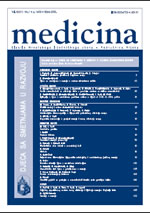
|
Medicina
Croatian Medical Association - Rijeka branch
ISSN: 0025-7729
Vol. 43, No. 3, 2007, pp. 179-187
|
 Bioline Code: me07025
Bioline Code: me07025
Full paper language: Croatian
Document type: Research Article
Document available free of charge
|
|
|
Medicina, Vol. 43, No. 3, 2007, pp. 179-187
| en |
The Pathogenetic Mechanism In Delayed Onset Muscle Sorenes
Ravlić-Gulan, Jagoda; Vrbanić, Tea Schnurrer-Luke; Boschi, Vladimir & Vogrin, Matjaž
Abstract
Delayed onset muscle soreness (DOMS) is the feeling of
pain, tenderness, deep ache and stiffness that usually
develops 24-48 hours after an unaccustomed or a high
intensity exercise and subsides generally within 5 to 7
days. Despite numerous studies there is no general consensus
on the underlying mechanisms of DOMS, treatment
or prevention strategies. A major causative factor is
eccentric muscle actions, i.e. active resistance to muscle
lengthening. However, the cellular basis for this response
remains unclear. Eccentric activities induce micro-injury
of muscle cells resulting in myofibrillar disruption, prolonged
loss of muscle strength, decrements in motor control,
changes in energy substrate levels and presence of
muscle proteins in the blood. Some recent research claims
that DOMS is not caused by the pain from damaged
muscle cells and secondary induced inflammatory processes,
but from the reinforcement process. The biological
response of muscle to eccentric contractions results in
strengthening and protection from further injury. The
muscle responds to training by reinforcing itself up to
and above its previous strength by adding new sarcomeres,
the segments in the muscle fibrils (sarcomerogenesis).
In this review, we summarize the muscle cell disturbances
and adaptation processes known to be involved in
pathogenetic mechanisms of DOMS which could be of
clinical importance in sports medicine.
Keywords
delayed onset muscle soreness, eccentric contraction, sarcomerogenesis
|
| |
| hr |
Patogenetski Mehanizam Sindroma Zakašnjele Mišićne Boli
Ravlić-Gulan, Jagoda; Vrbanić, Tea Schnurrer-Luke; Boschi, Vladimir & Vogrin, Matjaž
Zakašnjela (odgođena) mišićna bol (DOMS, od. engl.
delayed onset muscle soreness) sindrom je koji obuhvaća
slabost mišića, bol, duboku osjetljivost u mišićima koja
se javlja obično 24–48 sati nakon neuobičajene ili jako
intenzivne tjelesne aktivnosti, a prolazi za 5–7 dana.
Usprkos brojnim studijama koje se bave ovom problematikom,
još nisu usuglašeni stavovi ni o mogućem
patogenetskom mehanizmu DOMS-a niti o terapijskim
ili preventivnim mogućnostima. Kao glavni uzročni
čimbenik pojave DOMS-a navodi se ekscentrična kontrakcija
u kojoj se mišić tijekom održavanja napetosti
produžuje, ali mehanizam koji to objašnjava nije poznat.
Ekscentrična aktivnost mišića može inducirati ozljedu
mišićne stanice, koja se manifestira kao oštećenje miofibrilarnih
i citoskeletnih struktura, gubitak mišićne snage
i poremećaj slijeda aktiviranja motoričkih jedinica,
promjena metaboličkih zbivanja u stanici i izlazak enzima
u cirkulaciju. Novija istraživanja govore o mogućnosti
da bol nije uzrokovana isključivo mehaničkim
oštećenjima mišićne stanice i sekundarnim upalnim
odgovorima koji podražuje nociceptore, već adaptacijskim
procesima remodeliranja mišićne stanice, kojima se
povećava snaga mišića dodavanjem novih sarkomera
(sarkomerogeneza) i time štiti mišić od novih ozljeda. U
ovom radu donosimo pregled dosadašnjih spoznaja o
promjenama u mišićnoj stanici, za koje se misli da su uključene u patofiziološki mehanizam nastanka odgođene
boli u DOMS sindromu, a čije bi razjašnjavanje moglo
imati široku kliničku primjenu u sportskoj medicini.
odgođena mišićna bol, ekscentrična kontrakcija, sarkomerogeneza
|
| |
© Copyright © 2007 - Croatian Medical Association - Rijeka branch
Alternative site location: http://hrcak.srce.hr/medicina
|
|
